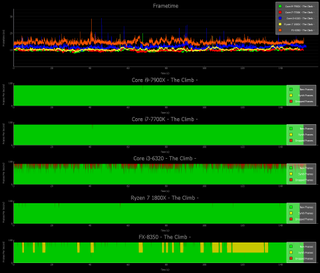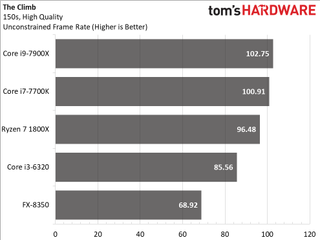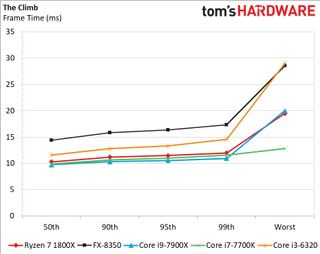CPU Performance In VR: 11 Games Benchmarked
The Climb
The Climb is a CryEngine-based title that Crytek suggests pairing with a Core i5-4590, at least. And if Robinson was any indication, this game might be expected to brutalize our lowest-end CPUs.

In fact, the dropped frames we see on our Core i3-6320 are even worse than they were in Robinson, causing the dual-core chip to average 80 delivered frames per second.
FX-8350 fares worse on paper, as it imposes high-enough frame times on our GeForce GTX 1080 Ti that the runtime kicks over into ASW on several occasions. But the resulting experience is smoother—we prefer the FX’s 1800 synthesized frames to the Core i3’s 1500 dropped frames.
Core i9, Core i7, and Ryzen 7 all appear to perform admirably. Let’s convert those frame times to frame rates once more...

Similar to Robinson, this CryEngine-based title favors Core i9 ever-so-slightly more than Core i7. This time, however, Ryzen 7 lands ahead of Core i3, which is of course hampered by dropped frames.

We know there’s an issue here from Core i3’s 50th percentile frame time of 11.5ms...and it only gets worse from there. By the time we’re looking at the 99th percentile, frames take as long as 14.5ms to render. And the worst-case frame time is a sluggish 29ms.
Incidentally, that’s right up there with FX-8350, though the FX-based platform’s other results are even worse. ASW cuts in early to smooth out those less-than-ideal render times, though.
Stay on the Cutting Edge
Join the experts who read Tom's Hardware for the inside track on enthusiast PC tech news — and have for over 25 years. We'll send breaking news and in-depth reviews of CPUs, GPUs, AI, maker hardware and more straight to your inbox.
MORE: Best Virtual Reality Headsets
MORE: All Virtual Reality Content
MORE: Virtual Reality Basics
-
lightofhonor At the end you recommend the Ryzen 5/i5 but don't actually test it. Also, a 1700 or 1700X would be a better apples-to-apples 7700K price comparison.Reply -
zippyzion Great article and lots of good testing. Now, since we've determined the best CPU for VR, do you think, perhaps, that you could take different GPUs and slot them into a 7700K system to give us relative GPU performance? Say from the RX 480/580, 1060, 1070, 1080, and 1080Ti? Or possibly throw a Vega into the mix?Reply
You might also consider doing a VR at budget review pairing components that make sense in different budget segments. Like an i3 or i5/RX 480 or 1600, i5/1060 or 1070, i7/1070 or 1080, or something like that.
If the goal is to help speed up VR adoption we need ideas of how VR would work on a variety of system configurations. If people don't know if their borderline system can handle VR without an upgrade, they aren't going to even try it. -
Sakkura I don't know why you disregard the minimum requirements specified by Oculus, when your tests confirm that a Core i3 and FX CPU both run well with ASW. That was the whole point of Oculus lowering system requirements - the ASW feature means the system can be basically half as powerful and still deliver a playable experience.Reply
Of course you wouldn't want to combine a GTX 1080 Ti with a low-end CPU like that, but a Core i3 or FX CPU with a GTX 1050 Ti will get you going in VR.
I'm also disappointed that you didn't include Lone Echo in the test. A lot more relevant than a mobile port like Gunjack, and it seems to be one of the most CPU-intensive VR games so far.
But at the end of the day it's still great to get some data on general VR performance.
Next up, maybe a Core i5-7600K and some older-gen chips from Intel? People don't all have the newest hardware, and might want to see if they can get a VR headset without a PC platform upgrade. -
cangelini The Core i3 had dropped-frame issues in CryEngine-based games that ASW didn't fix--for that reason, I'd try to free up budget for a quad-core if possible. The FX, of course, simply isn't balanced with a 1080 Ti (a point I tried to make in the conclusion after looking at the experiment's data). In the ends, as with regular PC gaming, it's a question of whether you want to "get going in VR" or have some room to turn up details and render 90 real frames per second. Leaning on ASW exclusively does introduce artifacts of its own--maybe we can illustrate that with slowed-down video in an upcoming piece (screenshots from the primer story may not be enough?). Thank you for the feedback!Reply
Chris -
kokolordas15 Please retest Pcars with a proper framerate.If you could also specify how many cars you have enabled in the run that would be nice.Reply
The CPU gets hit extremely hard the more cars you add. -
artk2219 These results are great data points but as other have pointed out, it seems you opened up a can of worms :-/. What about different configurations, different settings, older hardware, R9 290's instead of RX 480's / 580's etc etc. I love what you've given us so far, and i know you are definitely under time and budget constraints, but this begs a follow up article with more data points. Thanks for all you guys do though, i know you work hard and put out the best that you can, its just never enough for some of us :).Reply -
pdlevers I would be curious to see how a 2600k/2700k overclocked stacks up. A lot of people are stilling running those workhorses, and in many games they perform quite well despite being 5-6 years old.Reply -
sucker25 Well I have a 3770k running at 4.6 ghz with a 1080 ti ...............with the htc vive all my vr games run flawlessly.Reply
neither my video card nor cpu hit the 100% utilization mark.
if I had to I could still get a little more out of my cpu as I'm only hitting 40 degrees c.
was thinking of upgrading to 7700k but imo the difference in performance would be marginal.......so I will wait a little longer. -
chalabam I watched all those games on youtube, and not a single one made me want to play the game.Reply
Sorry, but 3D by itself is not a good reason to buy VR. All 3D games suck. -
Scarystuff1970 I wonder why every test have dropped frames? Have you done any investigation into what causes them? Even Gunjack with more than 400 fps have dropped frames? There must be a problem with a Windows process halting everything else? Maybe the same problem that have plaqued Win10 since the Creators Update with lag spikes in all games?Reply
Also I think it would maybe have been more appropiate if you had disabled ASW in these tests?
Most Popular



